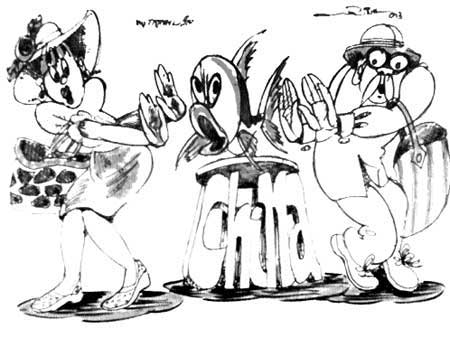|
Fishy sturgeon rumours
stem VN consumption
Consumers have been advised to stop buying sturgeon
with rumours spreading that illegally imported fish from
Nguyen Thuy Nga lives in Ha Noi's Cau Giay Ward. She
says that since the health warning broke early last month, she has stopped
buying the fish in the market.
"It's annoying because sturgeon is tasty and affordable
at VND180,000 per kilogram. My two children like eating it very much. The
people in charge should find out soon how dangerous it is so we can decide
whether to continue buying it or not."
Housewife Vuong Thi Hao, 64, from the capital's Hai Ba
Trung District, is also a keen fan of sturgeon. "It is delicious. I
first started buying it at a price of VND200,000 per kilogram, but not long
after that the price fell to VND150,000 at most and I started buying it all
the time."
She only stopped eating the fish last month after
hearing about the Chinese rumours from a friend. At that point she began
boycotting it, despite her husband's protests.
"I told him to eat local fish such as pike and
carp to be healthy, but he really likes sturgeon," Hao says.
She called for the mass media to report where the
sturgeons come from and whether they are really unsafe.
An inspectorate delegation from the Aquaculture
Department has travelled to the north-western
Tran Yen, one of the first contemporary businessmen to
raise sturgeon in the province's Tam Duong Commune, says a fish farm had
recently been opened near his by foreigners who he believes are from
"We should prevent any tricks; otherwise illegally
imported sturgeons may unfairly compete with local Vietnamese fish in the
market. This could damage Vietnamese fish owners, forcing them to close down
and leaving consumers with no option but to buy Chinese produce," he
says. The threat is all the more real, because sturgeon from
The Association of Cold Water Fish Raising Owners have
said that to evade anti-smuggling units, Chinese traders have tried to
associate with a number of Vietnamese fish farmers to pass off cheap imported
fish as legal.
In an interview with the Viet Nam Law newspaper, Do
Quang Tung, the director in charge of Viet Nam's CITES Office (Convention on
International Trade in Endangered Species of Wild Fauna and Flora), confirmed
that the Viet Duc Company is the only enterprise who have been licensed to
import baby sturgeons and sturgeon eggs into the country.
"We have never granted permission for any other
company to import these fish into the country. This means that any other
imported sturgeons are illegal," Tung said.
Tran Cao Muu, general secretary of the Viet Nam Fishery
Association, believes that agencies must immediately tackle the 'hidden
disaster' of Chinese sturgeons.
Deputy Minister of Agriculture and Rural Development
Nguyen Thi Xuan Thu told a meeting last Tuesday in Ha Noi that illegally
imported sturgeons have turned local markets upside down, threatening the
food safety of consumers and damaging the local cold water fishing sector.
"Leaders from the ministry have some doubts about
the safety of these fish. The situation is hard to prevent, but we must work
hard to stop the violations from increasing and solve this problem," she
said.
Thu said the Ministry of Agriculture and Rural
Development's Department of Managing Aquatic Product had begun testing 30
samples for verification that they are safe for consumers.
"Final results will be published in the media
soon," she said.
For Nga, Hao and other sturgeon lovers, that time can't
come soon enough.
Source: VNS
|
Thứ Sáu, 28 tháng 6, 2013
Đăng ký:
Đăng Nhận xét (Atom)

Không có nhận xét nào:
Đăng nhận xét